#Carmen Sisson
Text

"It's crazy to think they would have sailed right past here," Darron Patterson said, pulling his car onto a scrap of grass overlooking the murky Mobile River. As president of the Clotilda Descendants Association, Patterson is well versed in talking about the voyage of the Clotilda – the last known slave ship to reach America. His great-great-grandfather was Kupollee, later renamed Pollee Allen; one of the 110 men, women and children cruelly stolen from Benin in West Africa and brought to the US onboard the notorious ship.
The story of how Patterson's relative arrived in America aboard an illegal slaver started as a shockingly flippant bet. Fifty-two years after the US banned the importation of enslaved people, in 1860, a wealthy Alabama business owner named Timothy Meaher wagered that he could orchestrate for a haul of kidnapped Africans to sail under the noses of federal officers and evade capture.
With the assistance of Captain William Foster at the helm of an 80ft, two-mast schooner, and following a gruelling six-week transatlantic passage, he succeeded. The ship sneaked into Mobile Bay on 9 July under a veil of darkness. To conceal evidence of the crime, the distinctive-looking schooner – made from white oak frames and southern yellow pine planking – was set ablaze and scuttled to the depths of the swampy Mobile River, where it lay concealed beneath the water, its existence relegated to lore.
That is until almost 160 years later, when during a freakishly low tide, a local reporter named Ben Raines discovered a hefty chunk of shipwreck in the Mobile River, initially thought to belong to the Clotilda. It turned out to be a false alarm, but the discovery reignited interest and led to an extensive search involving multiple parties, including the Alabama Historical Commission, National Geographic Society, Search Inc and the Slave Wrecks Project. Following their exhaustive effort, in May 2019 it was finally announced that the elusive Clotilda had at long last been discovered.
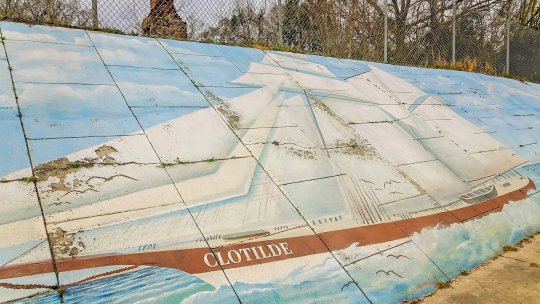
A mural of the Clotilda slave ship runs alongside the freeway separating the two sides of Africatown (Credit: Carmen K Sisson/Alamy)
Three years later, the city of Mobile found itself standing on the brink of a tourism boom, as interest in the story of the Clotilda, and the lives of its resilient captives, built.
Patterson had agreed to drive me around Africatown, an area where many of the ship's captives finally settled and where Patterson himself was raised. We began the tour at this scrap of land by the Mobile River, beneath a soaring interstate bridge where a group of Clotilda slave ship descendants meet annually for their Under the Bridge festival, to "talk about how our ancestors got here and to have some food and dance," Patterson said. There was no festival that day though and the atmosphere was muted; just one woman and her grandson played by the marshy water's edge below the steady hum of traffic.
Walking back to his car, Patterson, a former sportswriter now in his 60s, recalled that growing up, Africatown was a thriving, self-sufficient place, where "the only time we needed to leave the community was to pay a utility bill" as everything needed was close to hand, aside from a post office.
Located three miles north of downtown Mobile, Africatown was founded by 32 of the original Clotilda survivors following emancipation at the end of the Civil War, in 1865. Longing for the homeland they'd been brutally ripped from, the residents set up their own close-knit community to blend their African traditions with American folkways, raising cattle and farming the land. One of the first towns established and controlled by African Americans in the US, Africatown had its own churches, barbershops, stores (one of which was owned by Patterson's uncle); and the Mobile County Training School, a public school that became the backbone of the community.
However, this once-vibrant neighbourhood fell on hard times when a freeway was constructed in the heart of it in 1991, and industrial pollution meant that many of the remaining residents eventually packed up and left. "We couldn't even hang out our washing to dry because it would get covered in ash [a product of the oil storage tanks and factories on the outskirts of Africatown]," said Patterson. With the high-profile closure of the corrugated box factory, International Paper, in 2000, and an ensuing public health lawsuit brought about by residents, Africatown's community that had swelled to 12,000 people in the 1960s plummeted to around 2,000, where it stands today.
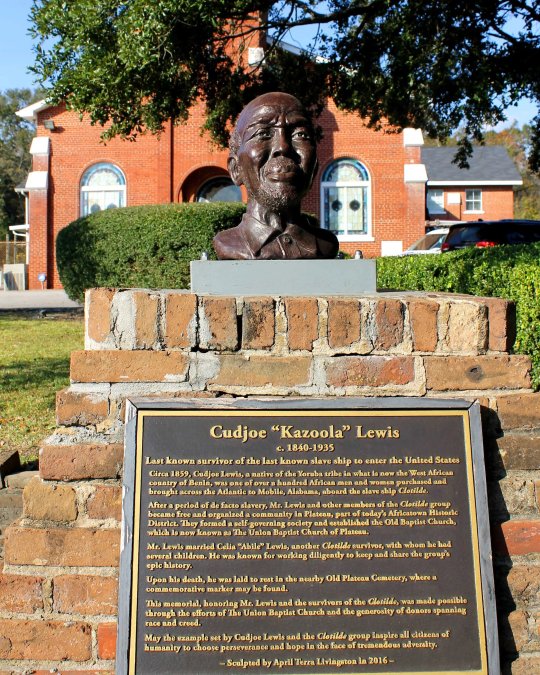
Cudjoe Kazoola Lewis, one of the Clotilda survivors and founders of Africatown, died in 1935 (Credit: Zoey Goto)
The exodus, poverty and environmental scars were visible as Patterson drove further into Africatown. The roadside was littered with abandoned factories. The quiet, residential streets were peppered with empty lots and vacant homes, some in such disrepair that their decaying walls had surrendered entirely to the creeping vines engulfing them.
But Africatown is changing, once again. With the discovery of the ship's remnants came the interest necessary to rebuild and preserve this historical place; an influx of attention and funds that is affecting everything from personal relationships to history to the fortune of the neighbourhood. Because, though the story of the Clotilda was known – and the lives of the original passengers were so well documented that photos, interviews and even film footage existed – without evidence of the vessel, the history was buried and it was not in the interest of the white population to acknowledge the truth of how they had arrived. Finding the vessel allowed their story to be affirmed and truth to be restored after decades of denial.
In the years since the Clotilda was discovered, the wreck has undergone extensive archaeological exploration to determine the likelihood of raising it safely. The ripple effect of media and public interest has meant a slew of government, community and private funding for Africatown's revitalisation, including The Africatown Redevelopment Corporation, which is using grants to restore homes in disrepair and demolishing and rebuilding derelict lots. Added to this is a $3.6 million payout from a BP oil spill settlement that has been earmarked for the long-awaited rebuilding of the Africatown Welcome Center, which was swept away in 2005 by Hurricane Katrina.
Patterson drove me to his grandmother's house and pulled over to chat with an elderly neighbour on her porch ("no photos, mind", she requested politely). Unlike some of the other descendent families, he told me, growing up he was told little of his ancestry. "I think my folks may have been embarrassed," he reflected, recalling that the smuggled captives had faced many humiliations, including being stripped naked for the voyage. "That must have just broke their will," Patterson said.
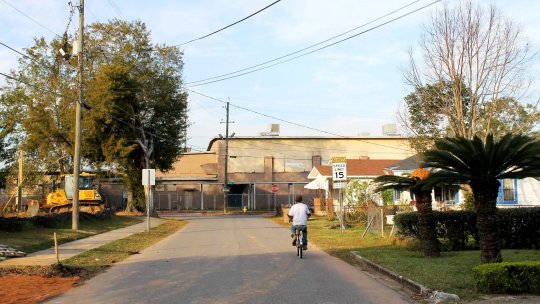
Africatown was one of the first towns established and controlled by African Americans in the US (Credit: Zoey Goto)
The 2019 announcement of the ship's discovery galvanised Patterson's curiosity, and he started to piece together his heritage, at which point his "whole life changed". He's since become hands-on in ensuring the story is told accurately, including an onscreen role in the film Descendant premiering at the 2022 Sundance Film Festival and as co-producer of the second installment of the forthcoming documentary The 110: The Last Enslaved Africans Brought to America about the Clotilda's passengers.
For Patterson, the discovery of the infamous ship brings fresh hope that Africatown is on the eve of a renaissance. Following years of denial, "the ship's very existence has finally been affirmed, so a burden has been lifted," said Mobile County Commissioner Merceria Ludgood. "That's every bit as important to the ethos of Africatown as the housing revitalisation currently happening."
Although there's a lack of restaurants and tourism facilities, that could be all set to change as well, said Ludgood, who is helping to set up the Africatown Heritage House, a permanent museum created in collaboration with the History Museum of Mobile to chart the history of Africatown. "Hopefully cottage industries will spring up, owned by people who live in the community," she said, noting that the discovery of the Clotilda has given Africatown's community a boost, resonating far beyond economics.
Next on Patterson's tour was the Africatown Heritage House, situated in the hub of the neighbourhood, overlooked by a row of modest, well-kept bungalows on a palm-lined avenue. Under construction at the time of my visit, the museum was due to open in early summer 2022 and will include a gallery of West African artefacts as well as salvaged sections of the Clotilda shipwreck, presented in preservation tanks.
“This is actually the best documented Middle Passage story we have as a nation”
It promises a unique insight, given the relatively recent timing of the Clotilda voyage in relation to the history of slavery. "This is actually the best documented Middle Passage story we have as a nation," explained Meg McCrummen Fowler, director of the History Museum of Mobile. "There's just an abundance of sources, mostly because it occurred so late. Several of the people on the ship lived well into the 20th Century, so instead of silence there's diaries, there's ship records."
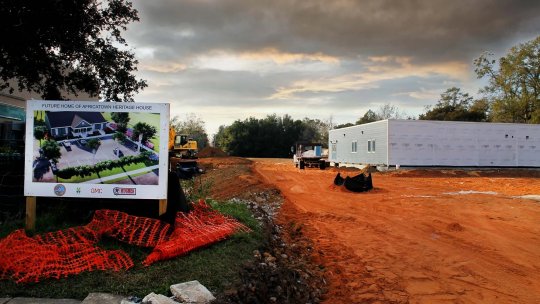
Work has started on the Africatown Heritage House, a $1.3 million exhibit about the 110 enslaved West Africans and the Clotilda vessel (Credit: Zoey Goto)
Further regeneration projects on the horizon include a footbridge connecting the two areas of Africatown currently divided by the freeway. Water tours taking visitors close to the shipwreck site are scheduled to launch in spring 2022, and a few local residents ahead of the curve are offering walking tours of Africatown.
While tourists have yet to arrive in serious numbers, Africatown faces a familiar set of challenges to other US neighbourhoods experiencing rapid revitalisation, including ensuring the whole community supports change and that residents don't fall through the cracks. But Patterson said that the Africatown community is united in its mission.
"We're all on board with this," he said.
The final stop on our tour was the cemetery where many of the Clotilda's enslaved have been laid to rest. As we walked, Patterson told me that with the light currently shinning on this troubling chapter of history, he has hopes that there will be enough sustained interest to generate the funds needed to raise the schooner from the water.
Though the true impact of this fabled ship's discovery is yet to be seen, for Patterson, it presents an opportunity to lift up the Africatown community and honour the struggles of its founders. "This is about more than bricks and mortar, it's ultimately about the growth of our souls," he said, looking out over their crumbling gravestones, all facing east towards their motherland. "Finding the ship has finally validated our truth."
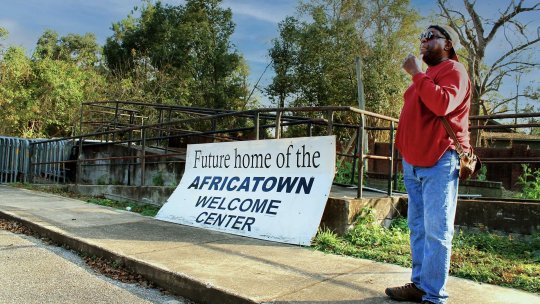
Unlike some of the other descendent families, Darron Patterson was told little of his ancestry (Credit: Zoey Goto)
#Africatown#clotilda#Cudjo#The Last Known Ship of the US Slave Trade#alabama#mobile#Black History Matters
2 notes
·
View notes
Text
Antonio Velardo shares: The extreme heat is a new torment in a Mississippi town battered by a tornado. by Carmen K. Sisson
By Carmen K. Sisson
Published: June 29, 2023 at 09:58AM
from NYT U.S. https://ift.tt/6PM0r4C
via IFTTT

View On WordPress
0 notes
Photo

"Somewhere in the Smoky Mountains." From Instagram.
#smoky mountains#autumn#fall#Carmen Sisson#great smoky mountains national park#landscape photography
15 notes
·
View notes
Text
something interesting is that while the infamous first line of Catallus’ Carmen 16 was originally either untranslated, omitted or mistranslated out of moral decency (because of its obscenity), it still didn’t receive an adequate translation for decades after the first attempts at rendering it accurately and with the obscenity preserved, because the word irrumabo had no English equivalent. Sisson, in 1967, actually reverses the meaning entirely and renders it “I’ll ... suck your pricks.” Amy Richlin was the first to render it accurately in 1983, but she has to spell it out in circumlocution, rendering it “fuck your mouths.” It’s still kind of an analogy which we have to picture, as if for the first time. It was difficult-to-impossible to put the blowjob reciever in the active role in a grammatically ordinary sentence. In the 21st century we finally invented a word adequate to irrumabo, and today the line is typically rendered: “I will sodomize and facefuck you.” What does it mean that we had no word for facefucking in those days, and what does it mean that we do now?
53 notes
·
View notes
Video
16/365 - The work day begins by Carmen Sisson
Via Flickr:
Lucky Tommy idles at the dock, waiting to head out, January 16, 2017, in Bayou La Batre, Alabama. (Photo by Carmen K. Sisson/Cloudybright)
#Alabama#Bayou La Batre#Gulf Coast#boats#dusk#seafood industry#shrimp boats#shrimping#sunset#water#USA
7 notes
·
View notes
Text
The Ketogenic Diet Explained with Dr. Joel Kahn - PTP292
In today's episode of The Plant Trainers Podcast, we talk to Dr. Joel Kahn about the ketogenic diet. The Ketogenic Diet, also known as Keto or putting your body into ketosis, is all the rage right now and has been for a while. We’ve seen friends and family have good short term results, but what are the long term effects this can have on your body. And we’ve heard you, our listeners who are writing comments on the show notes pages, commenting on Instagram, facebook and twitter “What about a plant-based Keto diet.” Is there really such thing? Is it better for you than regular keto? Can it be harmful long term? You all asked, so we got our expert cardiologist on to spread some scientific education. Basically, find out if friends should let friends keto. Please share this with those you love.
Joel Kahn, M.D., is a plant-based cardiologist who combines the best of Western and complementary therapies for total healing. Known as “America’s Healthy Heart Doc,” he graduated summa cum laude from the University of Michigan and has been practicing invasive, interventional and preventive cardiology since 1990. He is a clinical professor of medicine (cardiology) at Wayne State University School of Medicine and associate professor of medicine at Oakland University Beaumont School of Medicine. In 2013, Dr. Kahn received a certification from the University of South Florida in Metabolic Cardiology and became the first physician in the world to complete the program. Over the past 25 years, Dr. Kahn has improved the lives and vitality of thousands of patients, taking many of them from chronic health problems to vibrant living.
His passion for education and prevention is recognized by his patients and peer doctors alike. Dr. Kahn’s medical views are published by the Huffington Post and MindBodyGreen, among other media, and he is a frequent radio, TV and podcast guest. He was voted Sexiest Male Vegan Over 50 by PETA and won the Health Care Hero award from Crain’s Detroit Business. His fourth book, “The Plant-Based Solution: America's Healthy Heart Doc's Plan to Power Your Health”. And of course, he is the owner of GreenSpace Cafe in Michigan.
In this episode we discuss:
What is a ketogenic diet
What is ketosis
Is a ketogenic diet safe for the average person?
What about a plant-based ketogenic diet?
Question from Irina: “I still do not understand if plant-based keto is ok or not and if not why so?”
Is ketosis good for athletics, illness, longevity?
Links to things we mentioned:
Carpool Q & A - #askplanttrainers
Our Patreon
Dr. Joel Kahn: Website, Facebook, Twitter, Instagram
Facebook Page - Ban Hospital Food CarciNOgenic
The Great Ketogenic Diet Debate - The Doctors
The Plant-Based Solution: America's Healthy Heart Doc's Plan to Power Your Health by Dr. Joel Kahn
The Whole Heart Solution by Dr. Joel Kahn
Dead Execs Don't Get Business by Dr. Joel Kahn
GreenSpace Cafe
ProLon Fasting Mimicking Diet
The Longevity Diet: Discover the New Science Behind Stem Cell Activation and Regeneration to Slow Aging, Fight Disease, and Optimize Weight by Valter Longo
The Skeleton in The Ketogenic Diet Closet: What Virta Health, Mark Sisson, Joseph Mercola and Others Leave Out by Dr. Joel Kahn
Is the Low-Carb (animal based) Diet a High Coffin Diet? Two More Nails to Consider by Dr. Joel Kahn
Reversing Heart Disease with Dr. Joel Kahn – PTP091
The Plant-Based Solution with Dr. Joel Kahn - PTP231
Busting The Protein Myth with Dr. Garth Davis - PTP212
Whole Food Plant-Based with Dr. T. Colin Campbell - PTP286
Thank you to this month’s Patrons for supporting us on Patreon:
“Joe”
Millie Pearson
Mary Lou Fusi
Carmen Fanous
Emily Iaconelli
Spanish Armada
Michele Olender
Don’t forget to contact us at [email protected] with your questions!
We hope you enjoyed this podcast! Please take a moment and leave us a rating and review over on Apple Podcasts – we would be grateful! This will help get our podcast out to others who may enjoy it. We promise to read your reviews and consider your feedback. This show is for you.
Please subscribe to The Plant Trainers Podcast on your favorite podcasting platform.
Help us by spreading the news about our totally awesome Podcast!
Click here for a list of our services
Check out this episode!
0 notes
Text
100 books to read
Simple: Conquering the Crisis of Complexity - By Alan Siegel and Irene Etzkorn
The Anatomy of Buzz: How to Create Word of Mouth Marketing - By Emanuel Rosen
Everybody Writes: Your Go-To Guide to Creating Ridiculously Good Content - By Ann Handley
The Passion Conversation: Understanding, Sparking, and Sustaining Word of Mouth Marketing - By Robbin Phillips, Greg Cordell, Geno Church, and John Moore
The Celestine Prophecy: An Adventure - By James Redfield
Bold: How to Go Big, Create Wealth and Impact the World - By Peter H. Diamandis and Steven Kotler
Spark: The Revolutionary New Science of Exercise and the Brain - By John J. Ratey
A Journey of a Thousand Smiles: A Dentist's Guide to Oral Health - By Dr. Eugene Antenucci
Benjamin Franklin: An American Life - By Walter Isaacson
The 100-Year-Old Man Who Climbed Out the Window and Disappeared - By Jonas Jonasson
Everybody Writes: Your Go-To Guide to Creating Ridiculously Good Content - By Ann Handley
Disrupt You!: Master Personal Transformation, Seize Opportunity, and Thrive in the Era of Endless Innovation - By Jay Samit
Inner Work: Using Dreams and Active Imagination for Personal Growth - By Robert A. Johnson
Contagious: Why Things Catch On - By Jonah Berger
Steal Like an Artist: 10 Things Nobody Told You About Being Creative - By Austin Kleon
The Definitive Book of Body Language - By Barbara Pease and Allan Pease
Winning Body Language: Control the Conversation, Command Attention, and Convey the Right Message without Saying a Word - By Mark Bowden
What to Say When you Talk To Yourself - By Shad Helmstetter
Brave New World - By Aldous Huxley
Before You Think Another Thought: An Illustrated Guide to Understanding How Your Thoughts and Beliefs Create Your Life - By Bruce I. Doyle
How You Can Be More Interesting - By Edward de Bono
Social Intelligence: The New Science of Human Relationships - By Daniel Goleman
SuperBetter: A Revolutionary Approach to Getting Stronger, Happier, Braver and More Resilient - By Jane McGonigal
Zen and the Art of Motorcycle Maintenance: An Inquiry Into Values - By Robert M. Pirsig
The Bhagavad Gita - By Eknath Easwaran
The Disappearance of the Universe: Straight Talk about Illusions, Past Lives, Religion, Sex, Politics, and the Miracles of Forgiveness - By Gary R. Renard
Ask and It Is Given: Learning to Manifest Your Desires - By Esther Hicks and Jerry Hicks
The Stranger - By Albert Camus
Way of the Peaceful Warrior: A Book That Changes Lives - By Dan Millman
The Sedona Method: Your Key to Lasting Happiness, Success, Peace and Emotional Well-Being - By Hale Dwoskin
Walden - By Henry David Thoreau
Spiritual Warfare: Book Three of The Enlightenment Trilogy - By Jed McKenna
Spiritually Incorrect Enlightenment: Book Two of The Enlightenment Trilogy - By Jed McKenna
Spiritual Enlightenment, the Damnedest Thing: Book One of The Enlightenment Trilogy - By Jed McKenna
The Psychology of Self-Esteem: A Revolutionary Approach to Self-Understanding that Launched a New Era in Modern Psychology - By Nathaniel Branden
Radical Honesty: How to Transform Your Life by Telling the Truth - By Brad Blanton
No Excuses!: The Power of Self-Discipline - By Brian Tracy
Driven from Within - By Michael Jordan
The Six Pillars of Self-Esteem: The Definitive Work on Self-Esteem by the Leading Pioneer in the Field - By Nathaniel Branden
The UltraMind Solution: Fix Your Broken Brain by Healing Your Body First - By M.D. Mark Hyman
The Primal Blueprint: Reprogram your genes for effortless weight loss, vibrant health, and boundless energy - By Mark Sisson
Fantastic Voyage: Live Long Enough to Live Forever - By Ray Kurzweil and Terry Grossman
Losing My Virginity: How I Survived, Had Fun, and Made a Fortune Doing Business My Way - By Richard Branson
Titan: The Life of John D. Rockefeller, Sr. - By Ron Chernow
Andrew Carnegie - By David Nasaw
Steve Jobs - By Walter Isaacson
Financial Reckoning Day Fallout: Surviving Today's Global Depression - By Addison Wiggin and Will Bonner
The 21 Irrefutable Laws of Leadership: Follow Them and People Will Follow You - By John C. Maxwell
The Millionaire Next Door: The Surprising Secrets of America's Wealthy - By Thomas J. Stanley and William D. Danko
The Millionaire Fastlane: Crack the Code to Wealth and Live Rich for a Lifetime. - By MJ DeMarco
My Life in Advertising and Scientific Advertising - By Claude Hopkins
Zero to One: Notes on Startups, or How to Build the Future - By Peter Thiel and Blake Masters
The Hard Thing About Hard Things: Building a Business When There Are No Easy Answers - By Ben Horowitz
Never Eat Alone: And Other Secrets to Success, One Relationship at a Time - By Keith Ferrazzi and Tahl Raz
It Takes a Lot More than Attitude... To Lead a Stellar Organization - By Stever Robbins
Work the System: The Simple Mechanics of Making More and Working Less - By Sam Carpenter
The E-Myth Revisited: Why Most Small Businesses Don't Work and What to Do About It - By Michael E. Gerber
Think and Grow Rich - By Napoleon Hill
The Shallows: What the Internet Is Doing to Our Brains - By Nicholas Carr
How Pleasure Works: The New Science of Why We Like What We Like - By Paul Bloom
How the Mind Works - By Steven Pinker
Just Babies: The Origins of Good and Evil - By Paul Bloom
The Art Instinct: Beauty, Pleasure, and Human Evolution - By Denis Dutton
The Daily Stoic: 366 Meditations on Wisdom, Perseverance, and the Art of Living - By Ryan Holiday and Stephen Hanselman
How to Fail at Almost Everything and Still Win Big: Kind of the Story of My Life - By Scott Adams
Impossible to Ignore: Creating Memorable Content to Influence Decisions - By Carmen Simon
Nice Is Just a Place in France: How to Win at Basically Everything - By The Betches
Massive Life Success: Live a Stress-Free Life and Achieve Your Goals by Dealing with Anxiety, Stress and Fear - By Darius Foroux
A Theory of Human Motivation - By Abraham H. Maslow
Why We Do What We Do: Understanding Self-Motivation - By Edward L. Deci and Richard Flaste
Powerful Phrases for Dealing with Difficult People: Over 325 Ready-to-Use Words and Phrases for Working with Challenging Personalities - By Renee Evenson
The Road Back to You: An Enneagram Journey to Self-Discovery - By Ian Morgan Cron and Suzanne Stabile
Get Your Business to Work!: 7 Steps to Earning More, Working Less and Living the Life You Want - By George Hedley
Traction: Get a Grip on Your Business - By Gino Wickman
The Checklist Manifesto: How to Get Things Right - By Atul Gawande
Built to Sell: Creating a Business That Can Thrive Without You - By John Warrillow
Work the System: The Simple Mechanics of Making More and Working Less - By Sam Carpenter
Mentor Me: GA=T+E- A Formula to Fulfill Your Greatest Achievement - By Ken Poirot
Why Didn't They Teach Me This in School?: 99 Personal Money Management Principles to Live By - By Cary Siegel
Grow the F*ck Up: What your parents never taught you and school never did. - By John Kyle
Seuss-isms! A Guide to Life for Those Just Starting Out...and Those Already on Their Way - By Dr. Seuss
Fire Up Your Writing Brain: How to Use Proven Neuroscience to Become a More Creative, Productive, and Successful Writer - By Susan Reynolds
Writing With Quiet Hands: How to Shape Your Writing to Resonate with Readers - By Paula Munier
Spellbinding Sentences: A Writer's Guide to Achieving Excellence and Captivating Readers - By Barbara Baig
How to Read a Book: The Classic Guide to Intelligent Reading - By Mortimer J. Adler and Charles Van Doren
You Already Know How to Be Great: A Simple Way to Remove Interference and Unlock Your Greatest Potential - By Alan Fine and Rebecca R. Merrill
The One Minute Manager Meets the Monkey - By Ken Blanchard, William Oncken Jr. and Hal Burrows
The Wealth of Nations - By Adam Smith
Playing to Win: How Strategy Really Works - By A.G. Lafley and Roger L. Martin
99 Perseverance Success Stories: Encouragement for Success in Every Walk of Life - By Michal Stawicki and Jeannie Ingraham
1501 Ways to Reward Employees - By Bob Nelson Ph.D.
Everyday Etiquette: How to Navigate 101 Common and Uncommon Social Situations - By Patricia Rossi
As a Gentleman Would Say: Responses to Life's Important (and Sometimes Awkward) Situations (Gentlemanners) - By John Bridges and Bryan Curtis
How to Write It, Third Edition: A Complete Guide to Everything You'll Ever Write - By Sandra E. Lamb
Just Listen: Discover the Secret to Getting Through to Absolutely Anyone - By Mark Goulston M.D.
Talking to Crazy: How to Deal with the Irrational and Impossible People in Your Life - By Mark Goulston
Get Out of Your Own Way: Overcoming Self-Defeating Behavior - By Mark Goulston and Philip Goldberg
Cold Tangerines: Celebrating the Extraordinary Nature of Everyday Life - By Shauna Niequist
Savor: Living Abundantly Where You Are, As You Are - By Shauna Niequist
Trying Not to Try: Ancient China, Modern Science, and the Power of Spontaneity - By Edward Slingerland
0 notes
Photo
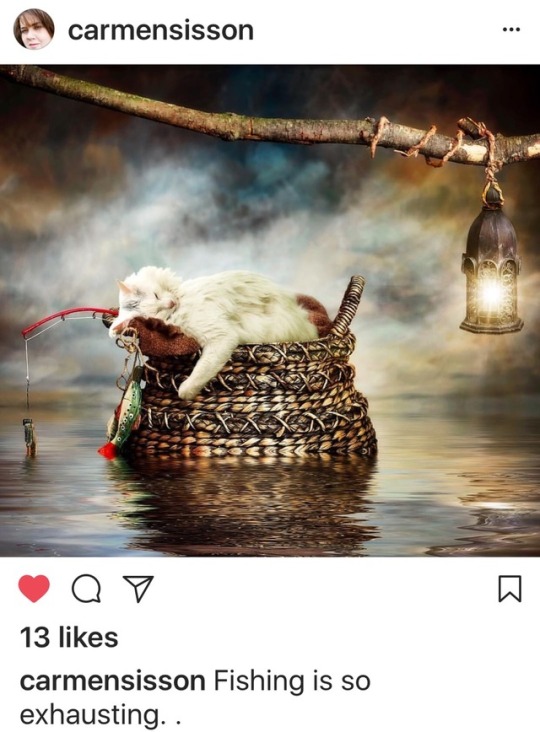
Love this composite picture from a South Alabama photographer and journalist. It looks like a page from an old children's book. From Instagram
12 notes
·
View notes
Photo
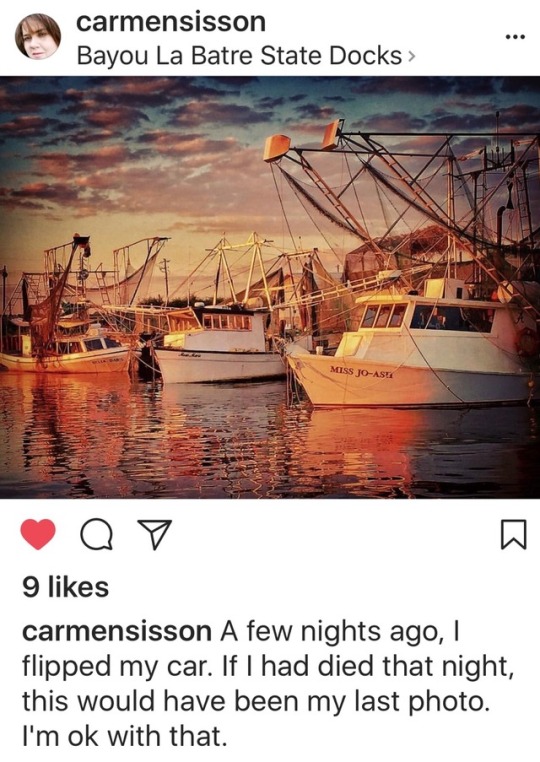
From the Instagram of an Alabama photographer I follow. Her words speak volumes about who she is and what she loves. Thankful she is still alive, especially for her dog and five cats.
1 note
·
View note
Text

“Mexico Beach looks worse than you can imagine. Mix Hurricane Katrina with Hurricane Frederic with the Tuscaloosa tornado. Multiply that by 1,000. Everything is gone, and what isn't gone is so badly mangled that it might as well be. It will be weeks, likely months, before power is restored. Power poles and pine trees are snapped in half. Live wires dangle like confetti streamers at some awful party no one wants to attend. The power sub stations are obliterated. The roof of the Methodist church is now in the middle of the highway. Ceiling fans stick up out of the sand like absurd seashells, detached from the homes where they once brought light and comfort. There are no seagulls and no signs of life beyond law enforcement and search and rescue teams digging, calling, hoping, praying. The closest cell signal is a specific parking space in a specific parking lot 20 miles away, and it's spotty. The closest gas is 50 miles up the road, cash only, IF they haven't sold out. Many residents have not yet seen their homes, and I dread the moment when they return to find nothing left. I fear for those who stayed behind. In the days ahead, we will hear stories of hope; I will find them. But tonight, sleeping in my car in an empty city, hope is hard to fathom. It is, however, the single greatest predictor of recovery. It is the one thing that neither man nor Mother Nature can fully destroy.”
Carmen Sisson is a fantastic photojournalist from South Alabama who is covering the aftermath of Hurricane Michael for The Washington Post. If you prefer truth with empathy from an experienced person who does her best work from behind a camera, then check her out: https://instagram.com/carmensisson?utm_source=ig_profile_share&igshid=11pvtujvn8quh
#carmen sisson#hurricane michael#devastation#mexico beach#florida#hope#photojournalism#truth over drama
5 notes
·
View notes